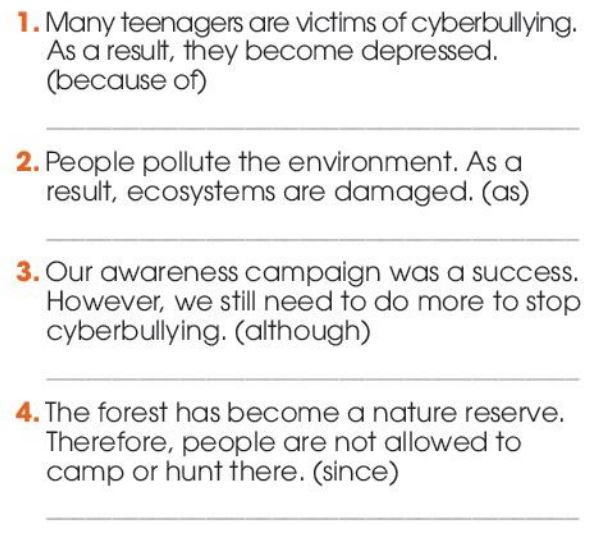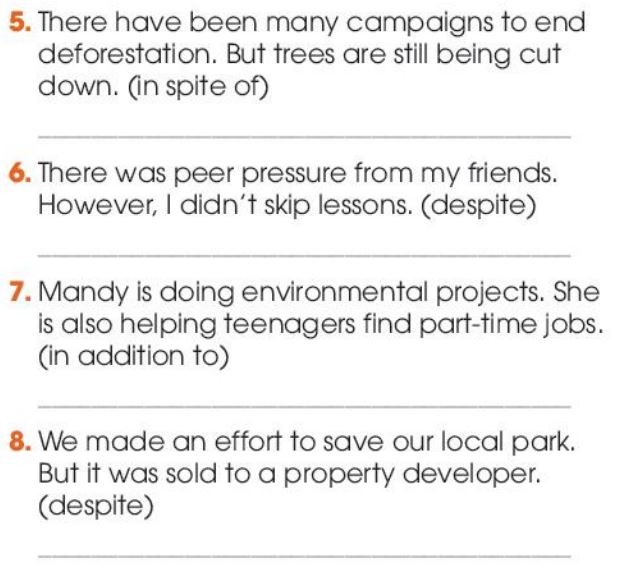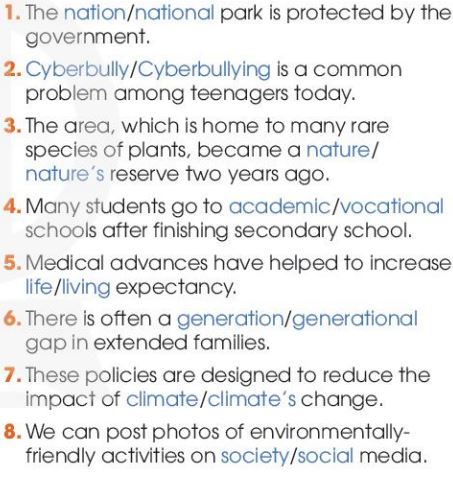Cùng HOC247 điểm lại những kiến thức ngữ pháp quan trọng đã học trong Unit 9 và Unit 10 chương trình Tiếng Anh lớp 11 Kết nối tri thức thông qua nội dung bài học Review 4 - Language. Trong bài học này, các em sẽ được ôn tập về các từ nối và cụm từ nối cũng như các danh từ ghép. Hi vọng đây sẽ là một bài học bổ ích giúp các em ghi nhớ tốt kiến thức ngữ pháp cơ bản, đồng thời ôn tập từ vựng và quy tắc phát âm.
Tóm tắt bài
1.1. Review 4 - Language lớp 11 Pronunciation
Pronunciation
Mark the intonation, using falling intonation or rising intonation. Then listen and check. Practise saying the sentences in pairs.
(Đánh dấu ngữ điệu, sử dụng ngữ điệu giảm hoặc ngữ điệu tăng. Sau đó nghe và kiểm tra. Thực hành nói các câu theo cặp.)
Guide to answer
1. Is this an example of negative peer pressure or bad decision-making?
(Đây có phải là một ví dụ về áp lực tiêu cực từ bạn bè hoặc việc ra quyết định tồi không?)
2. Have you ever experienced physical or verbal bullying?
(Bạn đã bao giờ bị bạo lực ngôn từ hoặc thể xác chưa?)
3. Is the most serious issue cutting down trees , hunting wild animals
, or littering?
(Vấn đề nghiêm trọng nhất là chặt cây, săn bắt động vật hoang dã hay xả rác?)
4. ls your awareness campaign going to focus on social issues , environmental problems, or educational themes?
(Chiến dịch nâng cao nhận thức của bạn có tập trung vào các vấn đề xã hội, vấn đề môi trường hay chủ đề giáo dục không?)
5. Cutting down forests is destroying the earth's ecosystems, isn‘t it? Governments should stop deforestation.
(Chặt phá rừng đang phá hủy hệ sinh thái của trái đất phải không? Các chính phủ nên chấm dứt nạn phá rừng.)
6. You have been to Cuc Phuong National Park, haven’t you? - No, I haven't.
(Bạn đã từng đến vườn quốc gia Cúc Phương phải không? - Chưa, tôi chưa từng đến.)
7. Buying products made from wild animals ls not good, isn’t it? We shouldn’t do it.
(Mua các sản phẩm làm từ động vật hoang dã là không tốt phải không? Chúng ta không nên làm điều đó.)
8. People don’t want to harm the environment, do they? But they do so little to protect it, don’t they?
(Mọi người không muốn làm hại môi trường phải không? Nhưng họ làm quá ít để bảo vệ nó phải không?)
1.2. Review 4 - Language lớp 11 Vocabulary
Vocabulary
What are the missing letters? Complete the sentences using the pictures to help you.
(Các chữ cái còn thiếu là gì? Hoàn thành câu sử dụng hình ảnh để giúp bạn.)
Guide to answer
1 - alcohol / violent
Drinking too much alcohol might lead to violent behaviour.
(Uống quá nhiều rượu có thể dẫn đến hành vi bạo lực.)
2 - afraid / bullied
You shouldn’t feel afraid when you are bullied. You need to stand up to bullies.
(Bạn không nên cảm thấy sợ hãi khi bị bắt nạt. Bạn cần phải đứng lên chống lại những kẻ bắt nạt.)
3 - depression / pressure
She is suffering from depression caused by too much pressure at school.
(Cô ấy đang bị trầm cảm do quá nhiều áp lực ở trường.)
4 - crime / physical
Crime is a serious issue in our city, and many people have recently become victims of physical attacks in the streets.
(Tội phạm là một vấn đề nghiêm trọng trong thành phố của chúng ta, và nhiều người gần đây đã trở thành nạn nhân của các vụ tấn công vật lý trên đường phố.)
5 - species / national park
There are thousands of animal species in this national park.
(Có hàng ngàn loài động vật trong công viên quốc gia này.)
6 - flora / fauna
Deforestation is destroying the local flora and fauna in the region.
(Phá rừng đang hủy hoại hệ động thực vật bản địa trong vùng.)
7 – biodiversity
We need to protect the biodiversity in local ecosystems.
(Chúng ta cần bảo vệ đa dạng sinh học trong các hệ sinh thái địa phương.)
1.3. Review 4 - Language lớp 11 Grammar 1
Grammar 1
Write one sentence using the linking words and phrases in brackets. Do not change the meaning of the original sentences.
(Viết một câu sử dụng các từ và cụm từ liên kết trong ngoặc. Không làm thay đổi nghĩa của câu gốc.)
Guide to answer
1. Many teenagers become depressed because of being victims of cyberbullying.
(Nhiều thanh thiếu niên trở nên trầm cảm vì bị bắt nạt trên mạng.)
2. As people pollute the environment, ecosystems are damaged.
(Vì con người gây ô nhiễm môi trường, hệ sinh thái bị phá hủy.)
3. Although our awareness campaign was a success, we still need to do more to stop cyberbullying.
(Mặc dù chiến dịch nâng cao nhận thức của chúng tôi đã thành công, nhưng chúng tôi vẫn cần phải làm nhiều hơn nữa để ngăn chặn bắt nạt trên mạng.)
4. Since the forest has become a nature reserve, people are not allowed to camp or hunt there.
(Vì khu rừng đã trở thành khu bảo tồn thiên nhiên nên mọi người không được phép cắm trại hoặc săn bắn ở đó.)
5. In spite of many campaigns to end deforestation, trees are still being cut down.
(Mặc dù có nhiều chiến dịch chấm dứt nạn phá rừng, nhưng cây cối vẫn bị đốn hạ.)
6. Despite peer pressure from my friends, I didn't skip lessons.
(Bất chấp áp lực từ bạn bè, tôi đã không trốn học.)
7. In addition to doing environmental projects, Mandy is also helping teenagers find part-time jobs.
(Bên cạnh việc thực hiện các dự án môi trường, Mandy cũng đang giúp thanh thiếu niên tìm việc làm bán thời gian.)
8. Despite our effort to save our local park, it was sold to a property developer.
(Bất chấp nỗ lực cứu công viên địa phương của chúng tôi, nó đã được bán cho một nhà phát triển bất động sản.)
1.4. Review 4 - Language lớp 11 Grammar 2
Grammar 2
Circle the correct answers.
(Khoanh tròn các câu trả lời đúng.)
Guide to answer
1 – national
The national park is protected by the government.
(Vườn quốc gia được chính phủ bảo vệ.)
Giải thích: Cụm từ “national park” (vườn quốc gia)
2 – cyberbullying
Cyberbullying is a common problem among teenagers today.
(Bắt nạt trên mạng là một vấn đề phổ biến của thanh thiếu niên ngày nay.)
Giải thích: Trước động từ “is” cần V-ing đóng vai trò chủ ngữ số ít.
3 – nature
The area, which is home to many rare species of plants, became a nature reserve two years ago.
(Khu vực này là nơi sinh sống của nhiều loài thực vật quý hiếm, đã trở thành khu bảo tồn thiên nhiên hai năm trước.)
Giải thích: Cụm từ “nature reserve” (khu bảo tồn thiên nhiên).
4 – vocational
Many students go to vocational schools after finishing secondary school.
(Nhiều học sinh học trường dạy nghề sau khi học xong trung học cơ sở.)
academic (adj): thuộc về học thuật
vocational (adj): thuộc về nghề nghiệp ⇒ vocational school: trường dạy nghề
5 – life
Medical advances have helped to increase life expectancy.
(Những tiến bộ y tế đã giúp tăng tuổi thọ.)
Giải thích: Cụm từ “life expectancy” (tuổi thọ).
6 – generation
There is often a generation gap in extended families.
(Thường có khoảng cách thế hệ trong các đại gia đình.)
Giải thích: Cụm từ “generation gap” (khoảng cách thế hệ).
7 – climate
These policies are designed to reduce the impact of climate change.
(Những chính sách này được thiết kế để giảm tác động của biến đổi khí hậu.)
Giải thích: Cụm từ “climate change” (biến đổi khí hậu).
8 – social
We can post photos of environmentally friendly activities on social media.
(Chúng ta có thể đăng ảnh về các hoạt động thân thiện với môi trường lên mạng xã hội.)
Giải thích: Cụm từ “social media” (mạng xã hội/ phương tiện truyền thông xã hội).
Bài tập minh họa
In 1959, the government of Egypt was working on a plan to build a dam on the River Nile. It was called the Aswan Dam, and it was intended to generate electricity and allow the river water to be used for agriculture. There was one big problem with the plan, though. The dam would flood a nearby valley that contained ancient Egyptian treasures, including two enormous stone temples.
It can be difficult for governments to choose culture and history over economics. However, if countries always made decisions like this, the majority of the world's ancient sites would end up being destroyed. Luckily, UNESCO stepped in. They formed a committee that tried to convince Egypt to protect its ancient treasures. With support from many countries, they were finally successful. The huge temples were carefully removed from their original site and moved to a safe location so that the dam could be built.
After their success in saving the temples in Egypt, UNESCO went on to save more sites around the world. They protected lagoons in Venice, ruins in Pakistan, and temples in Indonesia. With industrialization changing the world rapidly, there were many sites that needed to be saved. Eventually, UNESCO formed the World Heritage Organization to protect important natural and historic sites wherever it was necessary.
By now, the World Heritage Organization has protected hundreds of sites ranging from beautiful natural islands to buildings in large cities and ancient ruins. If you're able to visit any of the many protected sites, you'll agree it was worth it.
1. What is the best title for the passage?
A. UNESCO
B. UNESCO to succeed
C. UNESCO to develop
D. UNESCO to rescue
2. What is meant by the first sentence of the second paragraph?
A. Most governments prefer to sell their treasures.
B. Money sometimes seems more important than all other things.
C. Governments are never able to consider two things at once.
D. Governments usually don't know anything about their culture.
3. Why did UNESCO get involved in Egypt?
A. Egypt was planning to build a dam that would harm ancient temples.
B. Egypt was planning to build a valley for agriculture and electricity.
C. Egypt was planning to create a dam right on top of an ancient temple.
D. When the dam flooded a valley, several treasures were discovered.
4. Why is the World Heritage Organisation more important now than it would have been 200 years ago?
A. Countries didn't cooperate in the past.
B. Cities were smaller back then.
C. There were not as many interesting sites 200 years ago.
D. Modern business and production are changing the world.
Key (Đáp án)
1. D
2. C
3. A
4. D
Luyện tập
3.1. Kết luận
Qua bài học này các em cần ôn tập các nội dung chính sau:
- Pronunciation: Cách sử dụng ngữ điệu giảm, ngữ điệu tăng đối với câu hỏi đuôi.
- Vocabulary: Các từ vựng liên quan đến chủ đề về hệ sinh thái
- Grammar: Ôn tập về các danh từ ghép
3.2. Bài tập trắc nghiệm Review 4 - Language
Như vậy là các em đã xem qua bài giảng phần Review 4 - Language chương trình Tiếng Anh lớp 11 Kết nối tri thức. Để củng cố kiến thức bài học mời các em tham gia bài tập trắc nghiệm Trắc nghiệm Review 4 lớp 11 Kết nối tri thức Language - Ngôn ngữ.
Câu 4-10: Mời các em đăng nhập xem tiếp nội dung và thi thử Online để củng cố kiến thức về bài học này nhé!
Hỏi đáp Review 4 - Language Tiếng Anh 11
Trong quá trình học tập nếu có thắc mắc hay cần trợ giúp gì thì các em hãy comment ở mục Hỏi đáp, Cộng đồng Tiếng Anh HOC247 sẽ hỗ trợ cho các em một cách nhanh chóng!
Chúc các em học tập tốt và luôn đạt thành tích cao trong học tập!
-- Mod Tiếng Anh 11 HỌC247





.JPG)
.JPG)
.JPG)









